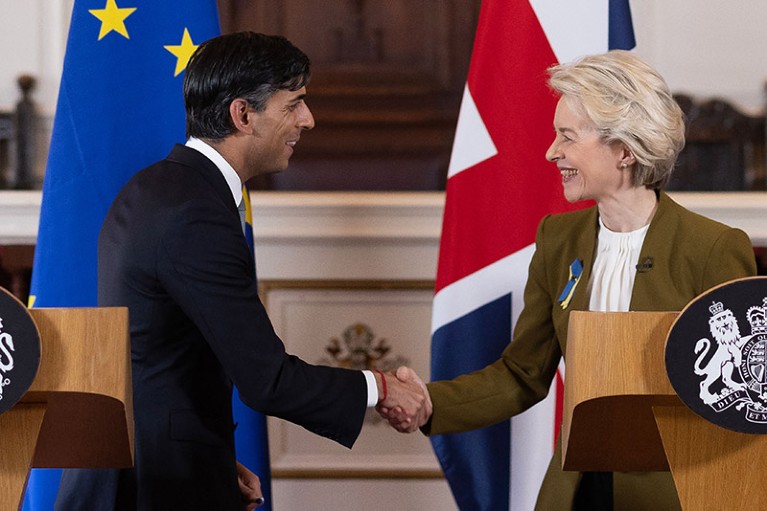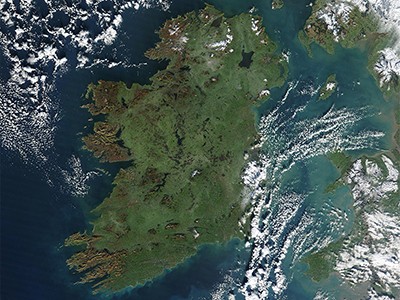
UK Prime Minister Rishi Sunak and European Commission chief Ursula von der Leyen shake hands following their post-Brexit deal that regulates trade through Northern Ireland.Credit: Dan Kitwood/Pool/AFP via Getty
UK researchers are optimistic that they will soon regain access to the European Union’s flagship Horizon Europe funding programme, after the United Kingdom and the EU reached an agreement on the status of Northern Ireland after Brexit. For the past two years, UK participation in the €95.5-billion EU research programme has been in limbo as negotiations dragged on over the Northern Ireland Protocol, which concerns the flow of goods between the United Kingdom and the EU through the UK territory.

How Brexit threatens Irish science’s cross-border collaboration
“This was the final obstacle to participation,” says Kieron Flanagan, who studies science and technology policy at the University of Manchester, UK. “Since continued cooperation in science was a stated political priority for both sides from the beginning, this should be it now.”
The agreement in principle reached on 27 February clears the way for the United Kingdom to join Horizon Europe as an ‘associate’ country, a type of membership held by some non-EU countries, such as Israel and Norway.
“The moment [the agreement] is implemented I’m happy to start immediately right now the work on an association agreement which is the pre-condition to join Horizon Europe,” said Ursula von der Leyen, president of the European Commission in a press conference. “So [it’s] good news for all those working in research and science.”
Diminished influence
Table of Contents
Joining as an associated country requires an annual financial contribution. UK-based researchers would have the same level of access to the programme as they did when the United Kingdom was a member of the EU, says Jo Burton, policy manager for the Russell Group of research-intensive universities, including being able to lead research projects.
Associated countries do not, however, have any say in the make-up of Horizon’s seven-year work programme — the decisions on what fields of research to prioritize. In the case of the current programme this is largely moot, because those decisions were made before it launched two years ago, but the same will be true of the next iteration. And the United Kingdom will have to decide again if it wants to sign up to that programme. “This is not a guarantee of ongoing participation,” says Flanagan.
Three hurdles remain to rejoining Horizon Europe, says James Wilsdon, who studies science policy at University College London. First is for the United Kingdom’s Conservative government to convince sceptics in its own ranks and in Northern Ireland’s Democratic Unionist Party to back the deal in parliament — or to rely on support from opposition parties if it cannot.
Second, while most details of the UK’s participation in Horizon Europe were already worked out two years ago, the parties must now negotiate the cost of joining. The UK government has said it intends to pay only for the time the country is actually associated with Horizon – and last week the Treasury clawed back £1.6 billion in unspent funds that had been earmarked for the programme.
“The UK remains open to association to Horizon based on fair and reasonable terms and that the UK will only pay for the period of association to a programme,” said junior treasury minister James Cartlidge in a written response to a question by Labour shadow science minister Chi Onwurah. “Any funding required for association in future years will be made available when there is clarity on UK association to EU programmes.”
Atrophied networks
The third hurdle may be the most difficult, says Wilsdon: rebuilding the networks of collaboration that have atrophied over the past few years. Participation by UK researchers in Horizon Europe projects has fallen by about 50% compared with before Brexit, he says, and it will take time to recover. “We can’t just reinsert ourselves after having been on the edges for so long,” says Wilsdon.
Despite these hurdles, rejoining Horizon Europe is incredibly important for UK science, says Burton. “Across the sector we all agree that participating in the programme is the best outcome for research and innovation,” she says. “Ending this period of uncertainty will give us the full breadth of access to the world’s largest collaborative research programme.”
Time is a concern, however. While the UK’s participation in Horizon Europe was paused, the UK government had made a guarantee to provide funds to UK researchers who had already won grants from the programme but who couldn’t receive them during negotiations. This guarantee runs out at the end of March. It could likely be extended on a rolling basis until a deal is finalized, says Flanagan, but researchers would prefer the uncertainty is resolved sooner rather than later.
“Association is solvable,” says Burton. “Now’s the time, with this renewed momentum and goodwill, to get it over the line.
